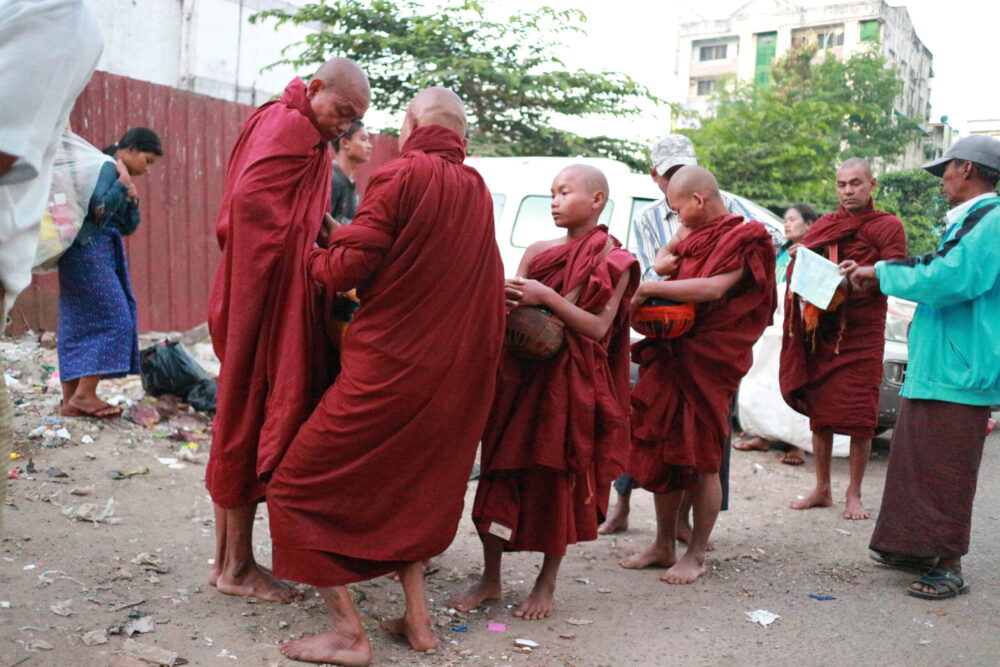[ad_1]
Around the world, reports of cyber-scam schemes targeting unsuspecting victims online have proliferated rapidly. Southeast Asia has become a center of gravity for those criminal syndicates, often in remote and war-torn corners. But in Cambodia, the scam industry has been flourishing well within the reach of officials.
For much of last year, dozens of nations reported that criminal gangs operating in Cambodia had lured tens of thousands of people into the country with the promise of high-paying jobs and free housing. Instead, they were forced to work for online scam mills while under intense surveillance in nondescript compounds, part of a multibillion dollar industry that has entrapped victims on both sides.
Under pressure, Cambodia announced a crackdown in August 2022. Since then, the authorities have said they have rescued more than 2,000 citizens from other countries, shut down five companies and detained 95 people. But New York Times interviews with law enforcement, rights groups and rescued victims detail how the shadowy industry has nonetheless continued to thrive because of powerful businessmen with close ties to senior officials in the Cambodian government, and a system of patronage that protects the mills from being investigated by the police.
Despite the crackdown and well-documented evidence linking well-known Cambodian officials to the mills, the country has not arrested any major figure.
The victims say they answered ads that they thought were legitimate, promising high salaries. Once trafficked into these scam compounds, they were held captive and forced to defraud people. Many were told to entice victims online with fraudulent investment opportunities, the promise of interest-free loans or the chance to buy items on fake e-commerce apps. If they performed badly, they were sold to another scam mill. Those caught trying to escape were often beaten.
Roughly 10,000 people from around the world are trapped in such compounds in Cambodia, according to the U.S. State Department; many of the victims are from China, Vietnam, Malaysia and Thailand. The governments of these countries have worked with Cambodia to rescue their nationals, but the efforts have mostly been on a case-by-case basis.
In June, Interpol said tens of thousands of people had been trafficked into Southeast Asia, starting first in Cambodia and then expanding into Myanmar and Laos. It warned that the trend of entrapping people to work for cyber-scam mills was multiplying, turning what had been considered a regional crime threat into a “global human trafficking crisis.”
One Victim’s Escape
In April, a 23-year-old Vietnamese man escaped from a white building in Cambodia’s Koh Kong Province, telling police he had been confined and ordered to work from 5:30 p.m. until 11 a.m. daily, according to a senior police officer from the area who spoke to The Times on the condition of anonymity because he was not authorized to speak to the media.
The man told the officer that he was forced to cheat victims online and had asked to leave, but his captors demanded a ransom of around $2,000. To escape, the man jumped from a window and ran into a jungle.
The senior police officer he spoke to was aware of what was happening at the compound — many victims had also asked to be rescued. But the officer knew that it was nearly impossible to get inside.
To do so, he said, required special permission from the Interior Ministry because of who is said to own the building: Senator Ly Yong Phat, one of Cambodia’s wealthiest tycoons and a personal adviser to Hun Manet, who took over from his father, Hun Sen, as prime minister last week.
Somkhit Vien, the deputy governor of Koh Kong, said the authorities had rescued 17 foreign nationals from India, China, Singapore, Malaysia, Indonesia and Thailand from compounds belonging to Senator Ly Yong Phat or his company, the LYP Group, since January. Mr. Ly Yong Phat did not respond to multiple requests for comment.
Characterizing the issue more as a workplace dispute than a crime, Mr. Somkhit Vien said there had been no reports of torture and that, in some instances, people asking for rescue wanted to leave but were not allowed because they had not cleared their “debt” with the companies. Many victims say that after being trafficked into the compounds, they were told that they could not leave until they paid a debt, or ransom, of thousands of dollars.
No evidence has emerged that directly links Senator Ly Yong Phat to the cyber-scam operations. But activists say tycoons like him play a crucial role: providing the cover to evade police scrutiny.
Cyber Scam Monitor, a group documenting the abuses that take place in the industry, has identified seven people it says have ties to businessmen who manage buildings that house cyber-scam operations. Some are senators, including Mr. Ly Yong Phat; others are officials, tycoons or relatives of officials or tycoons.
Even if the owners of the compounds are not directly involved in human rights abuses, they still bear responsibility “by virtue of their linkage to those businesses operating within the compounds,” said Pichamon Yeophantong, the chairwoman of the U.N. Working Group on Business and Human Rights.
Mr. Ly Yong Phat’s footprint extends to other compounds in Koh Kong and the northwestern town of O’Smach, where foreign workers said they had been confined and eventually rescued, according to local law enforcement and government officials. These buildings are often rented out to Chinese nationals whose identities are unknown, the officials said. Making arrests can be hard because many victims do not know the identities of their captors.
“The international community has been inconsistent in dealing with the political realities of power and crime in Cambodia,” said Naly Pilorge, the director for outreach with a Cambodian human rights group. There “needs to be a more coordinated and stronger response from regional and international actors” to address operations with such a large scale, she added.
The senior police officer in Koh Kong provided the account of the escaped Vietnamese man. Thkov Bunke, a local official, confirmed that a Vietnamese man had escaped from the area.
The ‘King of Koh Kong’
For decades, Mr. Hun Sen maintained power by giving a select group of wealthy supporters opportunities to make money. In return, they built schools and roads that Mr. Hun Sen’s party — the Cambodian People’s Party — took credit for.
This patronage system helps explain why it is unlikely that any officials implicated in an online scam operation will be held accountable, said Sebastian Strangio, the author of “Hun Sen’s Cambodia.”
“These powerful individuals that are involved in these things are people upon whom Hun Sen relies,” he said.
In the province where the Vietnamese man escaped, Mr. Ly Yong Phat is known as the “King of Koh Kong,” the owner of tracts of land and sugar refineries, and the businessman who financed a bridge linking the province to Thailand.
Last week, the Cambodian government announced that Mr. Ly Yong Phat had been appointed an adviser to Mr. Hun Manet, giving him a rank equal to that of a cabinet minister. Mr. Ly Yong Phat was previously an adviser to Mr. Hun Sen. These connections have made him virtually untouchable in the eyes of many Cambodian police officers.
A Botched Raid
Over the past year, law enforcement officers from China, Vietnam, Hong Kong, Taiwan, Indonesia and Vietnam have sought to rescue their citizens trapped in Cambodia. Several have found themselves stymied by the Cambodian police.
Thailand’s deputy national police chief, Gen. Surachate Hakparn, has accused the Cambodian police of being complicit in the country’s online scam operations and of not doing enough to hold officials responsible. When he arrived in the country last April to rescue more than 3,000 Thais he had identified in 17 locations, the Cambodian authorities tried to sabotage the mission, he said, and only about 100 were rescued.
During one operation in the coastal resort city of Sihanoukville, General Surachate said he knew victims were on the seventh, eighth and ninth floors of a hotel building. But on the day of the raid, he received a tip from an informant who said Cambodian authorities had moved the workers.
General Surachate said he confronted Cambodia’s then-police chief, Neth Savoeun, and accused him of trying to wreck the mission. “He deflected, saying the hotel owner didn’t cooperate,” General Surachate said. Last week, Mr. Neth Savoeun, who is married to a niece of Mr. Hun Sen, was promoted to deputy prime minister. He did not respond to a request for comment through a police spokesman.
General Surachate called the crackdown in Cambodia “all drama,” and said he is holding out hope that a coming joint operation with the Chinese police with the permission of the Cambodian authorities will help him rescue the remaining 3,000 Thais trapped in Cambodia.
Shutting any individual mill or rescuing those inside does not address the larger problem, said Jacob Sims, an adviser at the International Justice Mission, a human rights group.
“Without a strong focus on perpetrator accountability, one compound may close, but another will likely open in its place as long as the risk to doing so remains low,” Mr. Sims said. He estimates that the overall revenue generated from these operations in Cambodia could exceed $12 billion a year, based on official figures and victim statements.
‘I Could Have Died’
In May, a Filipino man named Nathan found himself in O’Smach, near the Thai border, after he was promised a customer service job in Thailand.
He said he realized something was amiss when he arrived at the Cambodia-Thailand border crossing and saw the barbed wire and high walls of the building he was supposed to live and work in.
On his first day, he was told he would not be working in customer service, but would be defrauding British and American citizens by striking up a romantic relationship with them through dating apps like Tinder.
Nathan, who spoke on condition that he be identified only by his nickname because he feared retribution, said he tried to leave, but was kicked, punched and beaten with a baseball bat and a metal pipe by six men as punishment. “I thought I could have died that day,” he said.
Nathan endured the beating and was finally let go by his overseers; he is not sure why. Now back in the Philippines, he said the owners of the compound need to be held responsible for what happened to him.
A reporter for The Times traveled to O’Smach and tracked down the building where Nathan was held. Two local officials said that the building belonged to Mr. Ly Yong Phat.
On June 22, the town had a groundbreaking for a new secondary school. Pen Kosal, a local official, wrote on Facebook that it was “a gift from Prime Minister Hun Sen via tycoon Ly Yong Phat.”
Muktita Suhartono and Camille Elemia contributed reporting.
[ad_2]
Source link





















